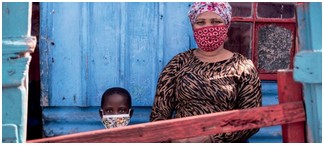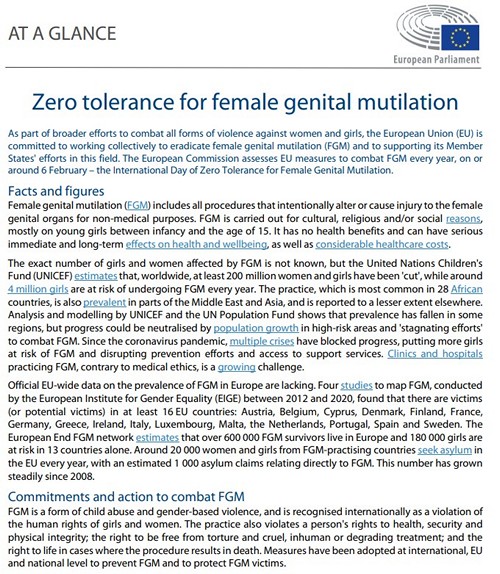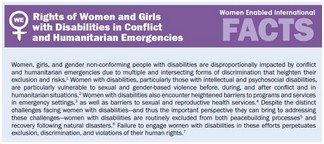COVID-19: The Turning Point For Pervasive Gender Inequalities & Profound Complex Consequences
Извор: WUNRN – 05.09.2021

Copyright © 2021 Tommy Trenchard/Panos Pictures
THE LANCET – https://www.thelancet.com/journals/lancet/article/PIIS0140-6736(21)01651-2/fulltext
The impacts of the COVID-19 pandemic have gone far beyond the disease itself. In addition to the increasing number of COVID-19 deaths, the pandemic has deepened social and economic inequalities.
July 16, 2021 – These indirect impacts have been compounded by pervasive gender inequalities, with profound consequences, especially for women, girls, and people of diverse gender identities.
There has been an escalation in gender-based violence within households, increasing risk of child marriages and female genital mutilation,and an increased burden of unpaid care work, with impacts on mental health.
Communities of people affected by HIV are, again, at the crossroads of injustice and targeted discrimination.
Measures to control the pandemic have reduced access to essential health and social welfare services, including sexual and reproductive health services, reduced employment and labour force participation, and decimated many household incomes.
Here again, women have borne the brunt of marginalisation, particularly those working in the informal sector. Intersectionality analyses have highlighted the inextricable effects of poverty, racial discrimination, harmful gender norms, and limited agency and opportunities for women, especially already marginalised women, even when they represent most of the front-line health workers.
The diversion of funds from other health and development programmes into economic recovery means that the pandemic is further eroding health gains made over decades, stalling progress on tackling gender inequalities.
There are, however, glimmers of hope. The gendered impacts of power, intersectionality, social, legal, and commercial determinants on health are foregrounded in public forums and can no longer be ignored. The pandemic has catalysed a need for concrete action on gender inequality. There is growing acknowledgment by governments that political leadership is required for key decisions about investments in health to ensure social protection and financial recovery, targeting of disadvantaged populations to ensure equity, and engaging with broader geopolitical challenges that impact on health.
With commitments by governments to strengthen health systems and the health workforce, and to enhance the quality of care and self-managed care, there are opportunities to learn from previous efforts to address gender inequalities.
Although there are still evidence gaps, our institutions, experts, and practitioners have decades of practice-based knowledge of strategies that work to drive gender equality impacts in health, including an understanding of the political and policy levers that are crucial drivers of change.
For example, the progress made in advancing sexual and reproductive health and rights and tackling gender-based violence has consistently been realised through the strong leadership and engagement of feminist civil society and women’s rights movements.The global health community is equipped now more than ever before to drive the gender equality agenda forward in pandemic responses and other health areas.
There is considerable evidence on the technical solutions that promote gender equality, and many of these solutions provide transferable lessons. For example, gender-balanced community health worker teams can achieve increased service coverage.
Group-based education interventions that tackle gendered power dynamics in relationships, communities, schools, and health-care settings can reduce intimate partner violence, HIV risk, and disrespectful maternity care.
Indeed, four decades of the HIV response have revealed that approaches addressing discriminatory social and gender norms and power structures are effective in improving women’s agency and sexual and reproductive health and rights.
The UN and the Mexican and French Governments convened the Generation Equality Forum, with the most recent held in Paris on June 30 to July 2, 2021, to make concrete commitments to act on and resource gender equality and women’s rights. Investments of US$40 billion were announced by governments and public sector institutions, UN entities, philanthropy, and the private sector.
The UN is where the technical meets the political. It has a key leadership role in working with partners to bring evidence-based solutions together to promote healthy living and wellbeing for all as part of the 2030 Agenda for Sustainable Development. As representatives of UN agencies, the UN Special Rapporteur on the Right to Health, and civil society partners, we commit to leveraging the full power of our collective influence, access, and resources. We are seizing the opportunity to apply our collective knowledge and learning to focus efforts on strategies that have made change happen.
First, we will reinforce and sustain our institutional capacity to deliver gender equality by increasing gender expertise in health, especially at senior levels. We will commit core financial resources to this agenda. Our organisations delivered results when our gender equality strategies were adequately resourced, and priority actions were central in our organisations’ core programmes of work.
Second, we commit to obtaining sex-disaggregated data from our programmes and member states for priority health indicators. Data provide a powerful and empowering visibility to gender inequalities. Despite decades of guidance requiring health data to be sex-disaggregated, this basic requirement for informed decision making is still far from being the norm.
The COVID-19 pandemic has shown that the health sector can do more to prioritise gender equality. Only 48% and 36% of 199 countries reported sex-disaggregated data on COVID-19 cases and deaths.
Third, we will continue to leverage the expertise and capacity of feminist civil society to support the design, implementation, and monitoring of health policies, programmes, and community-centered solutions and hold our institutions accountable to our commitments.
Innovative partnerships forged during the COVID-19 pandemic between governments, civil society, and the private sector have mitigated some disruptions in essential services, delivered essential commodities, supported survivors of violence, and brought justice to those unfairly persecuted.
To drive structural change, voices from feminist civil society are needed at decision-making tables in clinics, communities, and our institutional governance structures.
Finally, to control COVID-19 and mitigate its impacts, we need to tackle the structural determinants of gender inequality—eg, political participation and economic systems—and the intersections with other inequities. To do this effectively, we must join forces with social justice movements. Cross-movement activism had a pivotal role in the global HIV/AIDS response and ensuring access to HIV treatment in countries such as South Africa and Brazil.
Therefore, our commitment to gender equality during this pandemic goes hand in hand with our commitment to global COVID-19 vaccine equity.
Global vaccine inequity currently defines the global pandemic response. It is a moral and a public health failure that 75% of the 3·47 billion COVID-19 vaccine doses administered by July 12, 2021, were administered in only ten countries.
A feminist response requires immediate sharing of knowledge, transfer of technological know-how, scale up of manufacturing, and the waiver of intellectual property protections for COVID-19 vaccines, as well as responding to gender-related barriers during vaccine deployment, including access for pregnant women. This approach will be essential if we are to have a fighting chance to prevent the erosion and reversal of hard-won health and gender equality gains.



